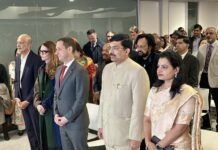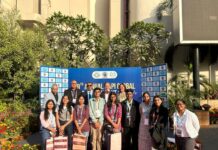Vidya Sethuraman
India Post News Service
Since the first coronavirus vaccinations were authorized for emergency use in December 2020, nearly 154 million Americans have been administered with at least one dose. And although the U.S. has experienced plateauing, and even increasing cases rates at times, the number of new infections has dropped significantly since
January, and precipitously in recent weeks, the U.S. is experiencing a drop in new daily infection rates and deaths from Covid, even as the nation is unlikely to reach herd immunity. Can the US maintain its protective bubble even as much of the world experiences surges in Covid infections and deaths. Speakers at the EMS Briefing on May 14 discussed the necessity for vaccinating the world, why it is in America’s best interests to do so, and the challenges of this enormous undertaking.
Dr. Marc Lipsitch, Professor of Epidemiology, and Director of the Center for Communicable Disease Dynamics at Harvard spoke on the improbability of the U.S. reaching herd immunity, and the pressing need to get theworld vaccinated. The United States is unlikely to reach herd immunity as more contagious COVID-19 variants spread and many Americans remain reluctant to get vaccinated. It is possible to achieve herd immunity in certain pockets. Reproductive numbers of the virus should be less than one to achieve herd immunity. With the emphasis remaining on vaccines, recent stats show that an alarming number of Americans are hesitant to make an appointment.
The most common reasons for vaccine hesitancy are concerns about side effects and the overall safety of the shots. He emphasized that the World needs to vaccinate its vulnerable population as early. He said it will be a quiet summer and may see some insurgence in the fall. He added we should share our vaccines with the entire World and save millions of lives now in South Asia.
Dr. Rosane Guerra is at the Department of Pathology, Biological and HealthSciences Center at the Federal University of Maranhao (UFMA) joined usfrom Brazil to discuss the surge of infections there, the rapid spread of the P1 variant, and implications for the rest of the world. She said The COVID-19 crisis in Brazil has reached critical levels, with 3,000 deaths registered daily on average. The health service has collapsed. The P1 variant of the virus, which originated in Brazil, has become a dire threat to the whole of Latin America, and the entire world.
Fault for this disaster lies primarily with the reactionary president Jair Bolsonaro, who has spent the last year downplaying the dangers of the coronavirus. The highly transmissible new strain of COVID-19 currently sweeping Brazil emerged in Manaus. We don’t have enough doses right now to vaccinate as fast as we should, she said. Given slow vaccine rollout, there are millions more Brazilians vulnerable to infection.
Dr. Ben Neuman, Chief Virologist at the Global Health Research Complex atTexas A&M University said there is one single global solution, which is vaccination. We are fortunate enough to have vaccines which are working against this virus, added Dr.Ben. Viruses, including the one that causes COVID-19, change constantly, resulting in new variants over time. They can acquire different characteristics, like the potential to increase transmissibility, cause more severe illness, avoid detection and evade immune response.
By stopping transmission through vaccination, variants are stopped from developing, said Benjamin Neuman. At this point, with just over half of adults in the U.S. vaccinated, we’re nowhere near the numbers we would need to actually get something like herd immunity. The lowest threshold for this is probably around 65%, and we would want to be somewhere closer to 80%.
Peter Maybarduk, Director of Public Citizen’s Access to Medicines group discussed the Covax initiative, which aims to get vaccines to low-income countries, and its shortcomings. Maybarduk also addressed waivers on intellectual property rights for Covid vaccines.
While Pfizer, Johnson & Johnson, and other major vaccine manufacturers have made commitments to COVAX, much of their supply has gone to wealthy nations, which now have huge surpluses as much of the developing world struggles to administer a single dose. Maybarduk said that in addition to supporting India and South Africa’s proposed patent waiver, “the U.S. government urgently should invest $25 billion in a new program to vaccinate the world.”







